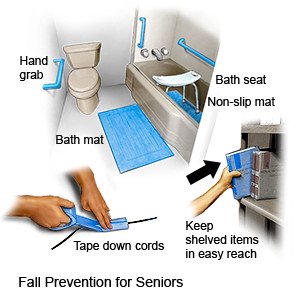Failure to Thrive in Older Adults
Medically reviewed by Drugs.com. Last updated on Aug 4, 2025.
What is failure to thrive in older adults?
Failure to thrive (FTT) happens when an older adult has a loss of appetite, eats and drinks less than usual, loses weight, and is less active than normal. He or she may not be interested in other people or social activities. He or she may also have memory loss, trouble thinking, and trouble with daily activities. Examples of daily activities include preparing meals, getting in and out of bed, walking, bathing, dressing, and using the bathroom.
What increases the risk for FTT?
- Social isolation or recent loss of a loved one
- Increased need for care
- Low income
- Depression or dementia
- Trouble swallowing
- Chronic pain or health problems such as cancer, lung disease, diabetes, or heart failure
- Loss of hearing or vision
- Side effects from certain medicines, such as pain medicine, blood pressure medicine, or diuretics (water pills)
- Alcohol abuse and other drug abuse
How is FTT diagnosed?
The healthcare provider will examine the person and ask if he or she takes medicines or has any health conditions. He or she will also ask about the person's daily activities, and if there has been a change in his or her ability to do them. He or she will also ask about the person's eating habits and amount of food he or she eats each day. The person may need any of the following:
- A mental exam checks the person's awareness, mood, and memory. The healthcare provider will ask the person if he or she knows his or her name, his or her location, and the date.
- Blood or urine tests check for infection, test kidney and liver function, or provide information about the person's overall health. Healthcare providers may also check alcohol levels.
- Hearing and vision tests may also be done.
- Imaging tests , such as a chest x-ray, CT, or MRI, check for infection or tumors.
Related medications
How is FTT treated?
Treatment depends on the cause of the person's FTT. He or she may need treatment for new or existing health problems. The healthcare provider may change a medicine if it is causing symptoms of FTT. The healthcare provider may prescribe medicine to improve appetite and mood.
Treatment options
The following list of medications are related to or used in the treatment of this condition.
What can I do to help a person with FTT?
- Offer foods that the person likes and are easy to eat. Offer healthy snacks and nutritional supplements between meals. These can provide extra calories and protein to increase energy and strength. Ask a dietitian for more information.

- Use herbs, spices, and flavor enhancers to add flavor to foods. Ask the healthcare provider or dietitian about flavor enhancers. Flavor enhancers with ham, natural bacon, and roast beef flavors can also be sprinkled on food to add flavor.
- Have the person drink liquids as directed to avoid dehydration. The person may be offered liquids between meals if they cause him or her to get full too quickly during meals. Ask how much liquid the person should drink each day and which liquids are best for him or her.
- Encourage social activities. Encourage the person to share meals with others as often as possible. Support from family and friends can give the person a sense of community and decrease feelings of loneliness.
- Talk with the healthcare provider about safe physical activities the person can do. Physical activity may help to increase the person's appetite. It may also help increase strength and improve balance.

- Help prevent falls. Keep paths clear so the person will not trip on objects such as shoes, books, or electrical cords. Remove small rugs or secure them with double-sided tape. Install bright lights in the person's home and place items that are regularly used within reach.

When should I seek immediate care?
- The person is not aware of his or her environment, is confused, or has hallucinations.
When should I call the person's doctor?
- The person's symptoms get worse.
- The person has a fever.
- The person has signs of dehydration. Examples include dark yellow urine, dry mouth and lips, dry skin, fast heartbeat, and urinating less than usual.
- The person does not have an appetite or is losing weight.
- The person frequently complains of pain.
- The person has a change in behavior.
- The person has new difficulty swallowing.
- The person falls frequently.
- You or the person has questions or concerns about his or her condition or care.
Care Agreement
Every person has the right to help plan his or her care. To help with this plan, the person should learn about his or her health condition and how it may be treated. The person and his or her healthcare providers can work together to decide what care the person wants to receive. The person always has the right to refuse treatment.The above information is an educational aid only. It is not intended as medical advice for individual conditions or treatments. Talk to your doctor, nurse or pharmacist before following any medical regimen to see if it is safe and effective for you.© Copyright Merative 2025 Information is for End User's use only and may not be sold, redistributed or otherwise used for commercial purposes.
Learn more about Failure to Thrive
Treatment options
Care guides
Further information
Always consult your healthcare provider to ensure the information displayed on this page applies to your personal circumstances.
